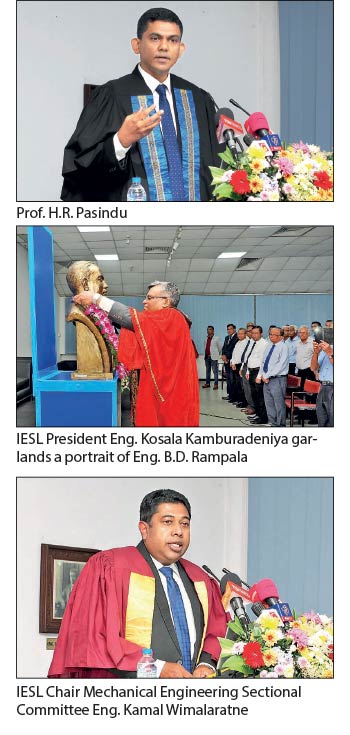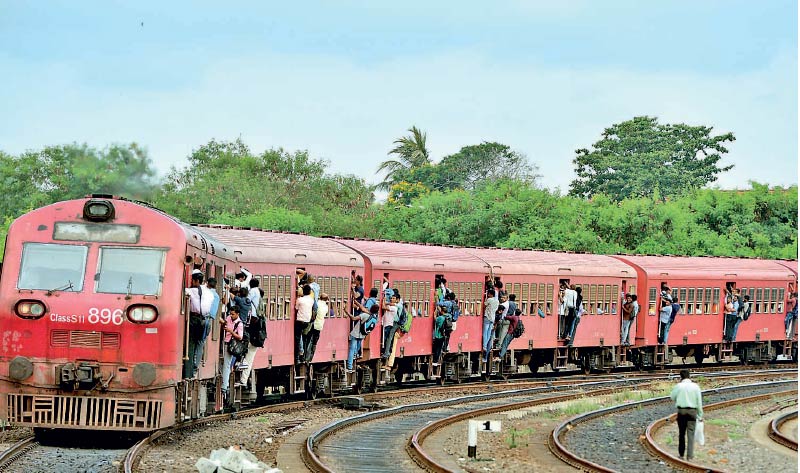Wednesday Feb 18, 2026
Wednesday Feb 18, 2026
Tuesday, 18 November 2025 01:17 - - {{hitsCtrl.values.hits}}
 Mechanical Engineering Sectional Committee of the Institution of Engineers, Sri Lanka (IESL) held the prestigious Eng. B.D. Rampala Memorial Oration 2025 on 14 November, where policymakers, engineers, academics, and transport-sector stakeholders came together to reflect upon the legacy of one of the greatest engineering pioneers of this nation-and to consider the urgent reforms needed to revive railway system of Sri Lanka.
Mechanical Engineering Sectional Committee of the Institution of Engineers, Sri Lanka (IESL) held the prestigious Eng. B.D. Rampala Memorial Oration 2025 on 14 November, where policymakers, engineers, academics, and transport-sector stakeholders came together to reflect upon the legacy of one of the greatest engineering pioneers of this nation-and to consider the urgent reforms needed to revive railway system of Sri Lanka.
Delivered by Prof. H.R. Pasindu the oration, titled “Framework for Restructuring Railways for an Efficient and Integrated Transport System”, offered a compelling and data-driven roadmap to transform Sri Lanka Railways into a modern, reliable, and economically sustainable national asset.
The event was a tribute to Eng. B.D. Rampala, the first Sri Lankan Chief Mechanical Engineer and visionary General Manager of the then Ceylon Government Railways, widely remembered as the architect of the railway’s golden era. Between 1955 and 1970, his leadership was characterised by innovation, discipline, and relentless pursuit of service excellence.
From dieselising the network and modernising the signalling systems to introducing iconic express services such as Ruhunu Kumari, Yal Devi, Udarata Menike, and Samudra Devi, his contributions revolutionised railway travel and shaped Sri Lankan transport culture for generations.
However, as the oration showed, the once-vaunted system nowadays suffers from deep structural problems that go far beyond technical failures. Based on substantial analyses and sector data, Prof. Pasindu underlined a sobering diagnosis: chronic financial losses, decaying infrastructure, unreliable services, outdated technology, and an institutional model that inhibits growth. Sri Lanka Railways operates today as a vertically integrated government department-a legacy structure that, according to the oration, is fundamentally misaligned with the demands of a competitive, customer-oriented transportation environment.
The numbers are scary on all financial counts: freight, which ought to be a cash cow, makes up less than 1% of the national freight market, while non-fare revenue—despite having more than 14,000 acres of land in its possession—is minimal. The infrastructure failures are equally alarming: frequent derailments, antiquated signalling technology, deteriorating tracks, and locomotives with limited availability. In 2022, over 60% of long-distance trains were more than 30 minutes late, further eroding public confidence.
But the oration made it emphatically clear: the problem is institutional, not technical. Overlapping roles for the State as owner, operator, policymaker, and regulator create unavoidable conflicts of interest and a system unable to respond to market realities. Short-term political interference, lack of professional autonomy, and an absence of commercial mindset have all contributed to the long-term decline of SLR.
To this, Prof. Pasindu presented a comprehensive and transformative restructuring framework based on internationally accepted best practices, adapted to the local context of Sri Lanka. Central to this approach was role separation: a new state-owned Sri Lanka Railways (SLR) to own land, tracks, and infrastructure; an independent Sri Lanka Railways Regulatory Commission (SLRRC) to enforce safety, pricing, standards, and licensing; a dedicated rolling-stock company to manage locomotives and carriages; and multiple train service operators selected through a transparent, competitive bidding process to run passenger and freight services.
This model, while ensuring that the State retains ownership of national assets, replaces direct political management with a commercially disciplined structure. It also allows private sector participation-not outright privatisation-but through concessions and through Public Service Contracts (PSCs). In the latter scheme, the Government pays operators transparently for socially necessary but unprofitable services, thereby eliminating hidden cross-subsidies that have undermined freight competitiveness.
The oration also emphasised integrated transport planning: seamless connections between rail and bus systems, unified payment platforms, real-time information systems, and multimodal passenger hubs-emulating the experience of Singapore. Another highlighted strategy is land value capture, which could unlock billions in long-term revenue through the commercial development of high-value railway lands around the stations.
Yet, the oration emphasised that reforms are not going to be easy: it will take political will, a change in legislation, negotiations with unions, and transitional funding over several years. Nevertheless, Prof. Pasindu insisted that doing nothing costs more: an ever-increasing financial burden for the Government, lost economic opportunities, and an increasingly unsustainable transport sector dominated by congestion on roads.
At the end of the event, IESL President Eng. Kosala Kamburadeniya, reiterated the commitment of the institution to evidence-based reforms and to the ideals upheld by Eng. Rampala: discipline, innovation, and professionalism. “If we are to build the railway system Sri Lanka deserves,” he said, “we must embrace the courage and foresight that Eng. Rampala exemplified.”
The 2025 Rampala Memorial Oration was meant not only to pay tribute to the memory of a vision-making engineer but also to invoke an invitation for Sri Lanka to reconsider its railway in modern times as an engine for national development-as once envisioned by Rampala himself.
